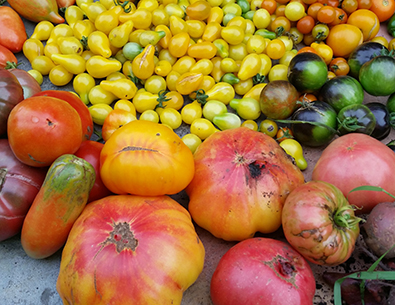Make the best of excess homegrown fruits, veggies and herbs. Wasting food should always be avoided, even when you grow the food yourself or received it in a community supported agriculture (CSA) share. Help out your friends and community members and donate produce you can’t use or preserve for later and prevent food waste in the process.
Where to donate food: you have options!
- Offer your homegrown food to family, friends, or neighbors.
- Start or add to a “free table” or food sharing space at your workplace.
- Use social media like NextDoor or Facebook groups to quickly spread the word.
- Donate to a local food pantry or other group, e.g. a senior association.
Using your personal relationships has some advantages. You can recruit someone to harvest for you, or get a reward like a home-baked pie in return for your bushel of apples!
People don’t realize that many hunger-relief agencies will happily take your homegrown fruits and vegetables. It’s worth calling your local food shelf to ask! Use this tool to search for food pantries.
Local organizations that welcome homegrown produce:
- VEAP in Bloomington
- ICA in Minnetonka
- Salvation Army in NE Minneapolis
- Sabathani Community Center in South Minneapolis
- The Food Group has a program called Fruits of the City where volunteers harvest fruits and vegetables to donate.
What kind of food to donate: nearly everything!
Popular and easy-to-use homegrown vegetables work well for food pantries, especially if they have a longer shelf life (things like beans, cucumbers or apples). Unusual varieties of fruits and veggies are best for friends and neighbors who can ask you questions about how to use them.
General tips on food donation:
- Donate homegrown food the day you harvest or receive fruits and vegetables to maximize shelf life.
- Donate food you’d eat: don’t donate bruised, overripe or insect-infested produce.
- Think “mostly clean.” Wipe off dirt but don’t wash with water; it can shorten shelf life.
- Separate your produce by type. This makes it easier for your recipient to get what they want and follow proper food storage.
- For more information on food storage and how to prevent food waste
Food donation is a powerful way to prevent food waste and make an impact in your community. Whether you're sharing your homegrown fruits and vegetables with family, friends, neighbors, or local food pantries, you're preserving resources and providing nourishment to your community. Remember that nearly everything from your garden can be donated, and by following some general tips on food donation, you can ensure your contributions are both valuable and appreciated. So, let's come together to share the bounty to prevent food waste through food donation; every little bit builds a more sustainable world.

